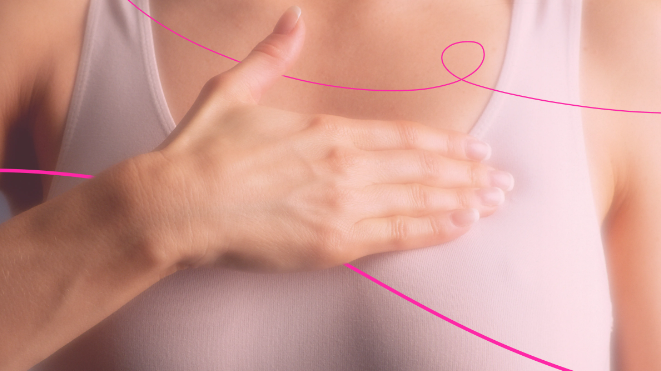According to the Singapore Cancer Registry 50th Anniversary Monograph, breast cancer is the most common cancer diagnosed in women in Singapore, accounting for 29.4% of all cancers diagnosed in women from 2013 to 2017.
Breast cancer occurs when some breast cells grow abnormally and may spread to the rest of the breast, lymph nodes, or other parts of the body. Early breast cancer typically does not present any symptoms, which is why regular screening is crucial. Women aged 40 and above should perform regular breast self-examinations and schedule mammograms for early detection.

Signs & symptoms of breast cancer
Breast lump
The most common symptom is a lump or mass in the breast. Most breast lumps are benign, caused by hormonal changes or conditions like fibroadenomas or cysts. If you find a lump, your breast specialist will conduct a thorough interview and physical examination, followed by imaging tests such as breast ultrasound or mammogram. Additional tests like a breast biopsy may be recommended if needed.
Changes in shape or size of breast
Swelling in any area of the breast or one breast appearing bigger than the other can indicate breast cancer. A significant change in breast shape or size warrants a visit to a breast specialist.
Unusual nipple discharge
Discharge that is stained with blood or pus, or appears greenish or yellowish, is uncommon and should be checked by a doctor immediately.
Dimpling or puckering of skin
Dimpling of the skin can suggest blocked lymph vessels, leading to inflammation and swelling. This could indicate inflammatory breast cancer and should be evaluated by a doctor.
Retracted nipple
A nipple that starts moving inwards can be a sign of breast cancer. If this occurs and you weren't born with a retracted nipple, see a doctor.
Rashes, itching, or redness
Although rare, these symptoms can be associated with Paget's disease, a condition linked to breast cancer. It presents as an eczema-like itchy red rash on the nipple or surrounding area.
Living with breast cancer
Being diagnosed with breast cancer can be overwhelming, but with proper medical help, you can manage the symptoms and live a fulfilling life.
Early-stage breast cancer (stages 0 and 1) has survival rates of over 90% with prompt treatment. If cancer is confirmed after imaging tests and biopsy, your breast specialist will explain the stage, necessary treatments, and provide advice on managing your condition with the support of a holistic breast care team.
Tips for managing your diagnosis
Seek information
Ask your doctor questions about managing your condition. Research treatment options and lifestyle changes that can improve your situation. Your doctor can help you decide what works best for you.
Understand physical changes
Breast cancer treatment may bring physical changes. Discuss these with your doctor beforehand to understand what to expect and receive a personalised treatment plan.
Build a support network
Don’t keep your emotions bottled up. Talk to family, friends, or support groups. Connecting with others who understand your journey, such as other breast cancer patients or survivors, can be invaluable.

Additional support
It is crucial to seek medical help if you detect any of the signs listed above. Many women live fulfilling lives despite a breast cancer diagnosis. The best way to prevent cancer is to adopt a holistic approach to health and wellness—eat whole foods, exercise regularly, look after your mental and emotional health, and build strong bonds with family and friends.
Book an appointment with our female breast specialists Thomson Breast Centre to address your breast concerns today.
For more information, contact us:
Thomson Breast Centre
Call: 6252 5535
WhatsApp: 8668 8697
Request an Appointment